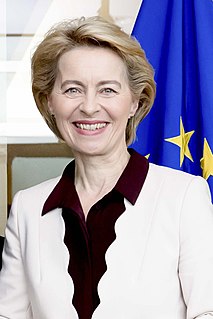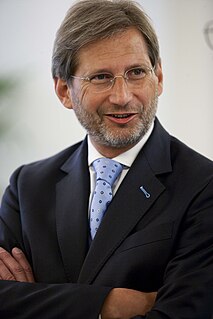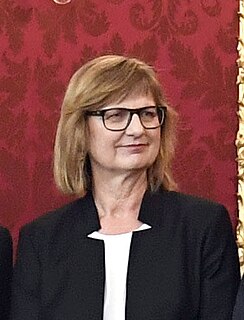
The Federal Chancellor of Austria is the head of government of the Republic of Austria. The position corresponds to that of Prime Minister in several other parliamentary democracies. The term is gendered in the German language.

Ursula Gertrud von der Leyen is a German politician and the president of the European Commission since 1 December 2019. She served in the federal government of Germany from 2005 to 2019 as the longest-serving member of Angela Merkel's cabinet. She is a member of the centre-right Christian Democratic Union (CDU) and its EU counterpart, the European People's Party (EPP).

Claudia Nolte is a German politician of the Christian Democratic Union (CDU), who became the youngest cabinet minister in German history whilst in office from 1994–98 and was Federal Minister for family, seniors, women and youth affairs and, by virtue of this office, presided over the European Union Council of Ministers. Nolte is a Catholic and is active in the Catholic community. She is married to investigative journalist David Crawford of CORRECT!V. With her marriage in July 2008, she changed her name to Claudia Crawford.

Johannes Hahn is an Austrian politician who has served as European Commissioner for Budget and Administration since 1 December 2019.

Manuela Schwesig is a German politician of the Social Democratic Party serving as the fifth minister-president of Mecklenburg-Vorpommern since 4 July 2017. She is the first woman to serve as head of government of this state. Previously she served as Federal Minister of Family Affairs, Senior Citizens, Women and Youth from 2013 to 2017.

Katarina Barley is a German politician and lawyer who has been a Member of the European Parliament since 2019. She served as Federal Minister of Justice and Consumer Protection and as Federal Minister of Family Affairs, Senior Citizens, Women and Youth in the fourth Cabinet of Angela Merkel. Prior to that, she had served as acting Federal Minister of Labour and Social Affairs from 28 September 2017, both until 14 March 2018.

Legislative elections were held in Austria on 29 September 2019 to elect the 27th National Council, the lower house of Austria's bicameral parliament. The snap election was called in the wake of the Ibiza affair in May, which caused the resignation of Vice Chancellor Heinz-Christian Strache and the collapse of the governing coalition of the Austrian People's Party (ÖVP) and Freedom Party of Austria (FPÖ). The government subsequently lost a motion of no confidence in parliament, and ÖVP Chancellor Sebastian Kurz was replaced by non-partisan Brigitte Bierlein on an interim basis.

Brigitte Bierlein is an Austrian former jurist who served as Chancellor of Austria from June 2019 to January 2020. An Independent, she was the first female Chancellor of Austria.

Juliane Bogner-Strauß, is an Austrian molecular biologist, biochemist, and politician in the Austrian People's Party (ÖVP). Since October 2013 she is Associate Professor at the Institute of Biochemistry of Graz University of Technology. From 18 December 2017 she was Federal Minister for Families and Youth of the Republic of Austria, since 8 January 2018 she is Federal Minister for Women, Families and Youth in the Federal Chancellery. Since 9 July 2018, she is the Federal Minister for Sustainability and Tourism.
Events from the year 2019 in Austria.

The Bierlein government was the 32nd Government of Austria following the collapse of the First Kurz government headed by Chancellor Sebastian Kurz in the aftermath of the Ibiza affair. Sworn in on 3 June 2019, the Bierlein government was the first purely technocratic government in Austrian history, first interim government after a successful motion of no confidence in Parliament and first government headed by a female chancellor. As head of government, Brigitte Bierlein was assisted by Clemens Jabloner as vice-chancellor.

Eduard Müller is an Austrian politician and author. He served as Minister of Finance in 2019. He also managed the Ministry of Civil Service and Sports.

Maria Patek is an Austrian civil servant who served as the Minister for Sustainability and Tourism in the Bierlein government.

Iris Eliisa Rauskala is a Finnish-born Austrian civil servant and economist who served as Minister of Education, Science and Research in the Bierlein government.

Brigitte Zarfl is an Austrian civil servant. She served as Minister for Labour, Social Affairs, Health and Consumer Protection in the Bierlein government.

Elisabeth Udolf-Strobl is an Austrian civil servant. She served as Minister for Digital and Economic Affairs in the Bierlein government.

Andrea Kdolsky is an Austrian physician and retired politician who was Minister for Health, Family and Youth in the Gusenbauer government.

Michaela Marion Noll is a German lawyer and politician of the Christian Democratic Union (CDU) who has been serving as a member of the Bundestag from the state of North Rhine-Westphalia since 2002.

Elisabeth Winkelmeier-Becker is a German lawyer and politician of the Christian Democratic Union (CDU) who has been serving as a member of the Bundestag from Rhein-Sieg-Kreis I in the state of North Rhine-Westphalia since 2005. In 2019, she was appointed Parliamentary State Secretary at the Federal Ministry of Economic Affairs and Energy under Minister Peter Altmaier in the government of Chancellor Angela Merkel.



















